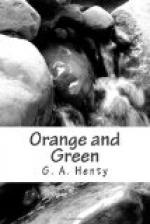Accordingly, there was a very numerous attendance of gentry on the day fixed. Saint Ruth appeared on the ground with a large body of cavalry. He made a speech to the gentlemen—complimented them on their punctual attendance and gallant appearance; told them that it was necessary that every man should make sacrifices for the defence of his religion and his estates, and requested them to hand over their horses to the cavalry. He then at once rode off the ground, leaving the cavalry to take possession of the horses.
Anger and expostulation were useless, and the gentlemen had to return on foot, sadder men; but the army obtained a large and valuable addition of horses, and Saint Ruth was able to march out at the head of twenty thousand foot, and five thousand well-appointed cavalry.
Their direction was Athlone, towards which point Ginckle was also directing his movements, having assembled his whole force at Mullingar, withdrawing the garrisons from almost all the towns, in order to raise his force in the field. The alarm in Dublin was, in consequence, extreme, and the council and lords justices besought Ginckle not to leave them without protection; but he only replied that they had it in their own power to put an end to the war, by publishing such a declaration of pardon and security, for person and property, as would satisfy the Irish in James’s army. But the council, even in this moment of alarm, refused to renounce their golden hopes of confiscation.
Ginckle’s first attack was directed against the village of Ballymore, which lay between Mullingar and Athlone. It was defended by a thousand cavalry and infantry, and a sergeant and a few men were posted, in a castle, on an eminence some distance from the village. The first attack was made on the castle, but the sergeant and his little garrison made a long and gallant resistance, and the savage Dutchman was so infuriated at the opposition that, when at last the post was taken, he ordered the gallant sergeant to be at once hung.
He then sent word to the garrison of the village that, if they did not surrender, he would serve them as he had served the sergeant. They were unmoved by the threat, and made a long and gallant defence against the whole of Ginckle’s army; and the Dutch general was unable to overcome their resistance, till he at last offered fair terms of surrender. The position being a strong and important one, Ginckle spent some days in adding to the defensive works the Irish had erected, before he moved forward and sat down in front of Athlone. His army was well provided with heavy artillery and everything necessary for a siege, and he was firmly resolved that there should be no repetition of the disastrous failure of the preceding autumn.




